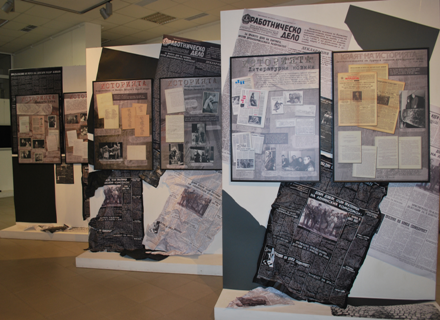Комисията излезе с Решение № 3-8 от 08.07.2025 г. - Държавни дружества - Министерство на земеделието и храните
Комисията излезе с Решение № 3-6 от 03.07.2025 г. - Държавни фирми - Министерство на земеделието и храните
Комисията излезе с Решение № 3-4 от 25.06.2025 г. Държавни фирми - Министерство на земеделието и храните
„Десталинизацията – дилемата на едно противоречиво десетилетие (1953-1964)”
Изложбата „Десталинизацията – дилемата на едно противоречиво десетилетие (1953-1964)” е събитие в рамките на Президентската инициатива „25 години свободна България” и е партньорски проект между Комисията по досиетата, Държавна агенция „Архиви”, СУ „Св. Климент Охридски” и Националния музей на българското изобразително изкуство.
След смъртта на Сталин започват и първите опити на открита съпротива срещу комунистическия режим в държавите от Източния блок. Това са години, свързани с реалните надежди на мнозина за отхвърляне на съветския модел на управление, първите опити за пробив на Желязната завеса.
В България процесът тръгва плахо и до известна степен “плакатно”. Следвайки и този път съветския опит, комунистическата партия заклеймява култа към личността на Вълко Червенков, но само след няколко години, в рамките на същото това “противоречиво” десетилетие, той се преобразува в нов култ, този път към Живков.
Въпреки че от днешна гледна точка изглеждат наивно опитите на отделни представители на интелигенцията, дейци на културата и изкуството, да излязат от задушаващия кофраж на партийната усмирителна риза, те все пак доказват, че не всичко е докрай изгубено. Тези опити, обаче, получават бързо възмездие от официалната, т.е. партийната власт: уволнени редактори на вестници (Владимир Топенчаров и Васил Акьов), спрени отделни спектакли (“Импровизация” на Радой Ралин и Валери Петров), разгромяване на цели театрални колективи (Бургаският театър), спрени филми преди премиера (“Животът си тече тихо” на Бинка Желязкова и Христо Ганев) или прибрани от прожекции непосредствено след премиерите (“На малкия остров” по сценарий на Валери Петров и “Невероятна история” на Радой Ралин). Художниците и писателите също имат своите изключени от редиците на партията, спрени изложби, неиздадени стихосбирки, изключени от съответните творчески
Подбраните материали показват малкоизвестни и неизползвани досега исторически документи. Чрез визуално и документално представяне на събитията от 50–60-те години на 20 в. се проследяват вътрешните и международните аспекти на процеса, популярен с термина „десталинизация” не само в България, но и в страните от Източна Европа. съюзи.
България, въпреки че няма унгарската 1956 г. или чехословашката 1968 г., няма Солженицин или Джилас, нито Ян Палах или Имре Наги, показа отношението си към казармения социализъм и изживя своето противоречиво десетилетие.
Логичният край е негласното закриване на процеса след падането на Хрушчов.
В изложбата са използвани документи и фотографии, съхранявани в Държавна агенция “Архиви” и Комисията по досиетата, кинокадри от Българската национална филмотека, сайта “Изгубената България”, както и от частни архиви на семейство Пауновски, семейство Акьови, архивът на Радой Ралин, архивът на Веселин Байчев, архивът на Владимир Люцканов и Антоанета Бочурова и др.

Решения
>> Решение № 3-6 от 03.07.2025 г. - Държавни дружества - Министерство на земеделието и храните
>> Решение № 3-4 от 25.06.2025 г. - Държавни дружества - Министерство на земеделието и храните
>> Решение № 3-3 от 17.06.2025 г. - Държавни дружества-Министерство на земеделието и храните
>> Решение № 3-1 от 10.06.2025 г.- Отраслова приватизация 1998 г.
>> Решение № 2-2465 от 20.05.2025 г.- Отраслова приватизация 1998 г.
>> Решение № 2-2464 от 12.05.2025 г.- Отраслова приватизация 1998 г.
>> Решение № 2-2462 от 08.05.2025 г.- Отраслова приватизация 1998 г.
